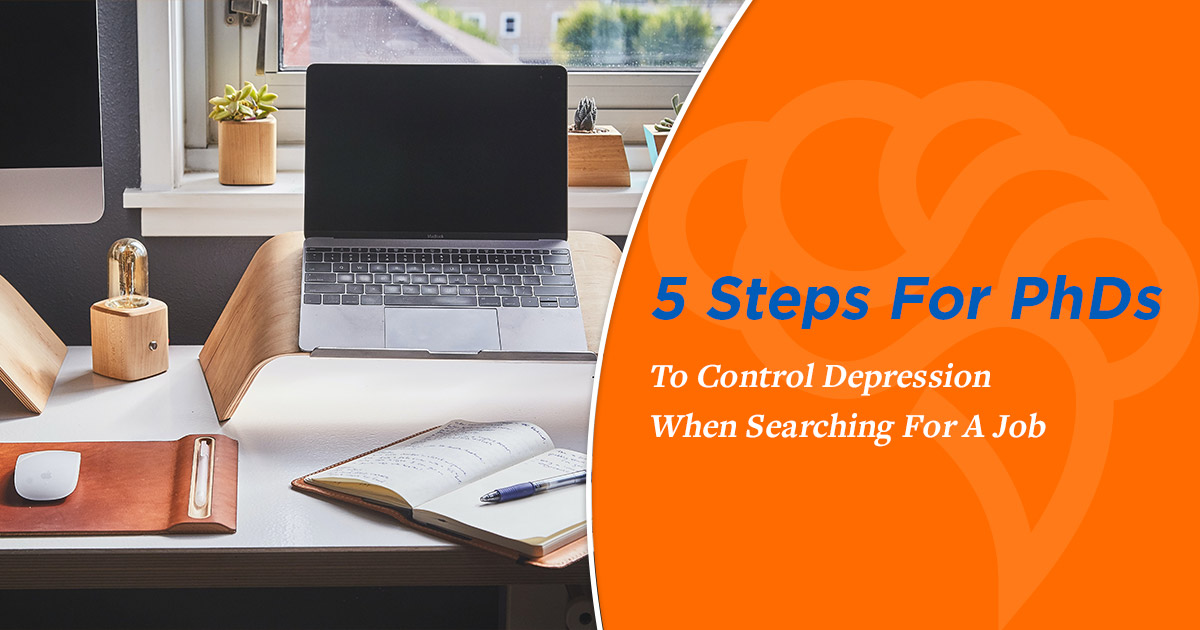5 Steps For PhDs To Control Depression When Searching For A Job

I could not believe what the doctor was saying.
I had shingles.
Brought on by stress and lack of sleep, the doctor said.
I was a PhD student with overwhelming amounts of stress, and a never-ending to-do list defined my life.
But shingles? I thought only the elderly got shingles. I was 26.
I was in the prime of my life and I had a disease that attacks people with weakened immune systems.
It was horrible.
I was miserable.
The couple of weeks that I had shingles were terrible… I was in constant pain and hardly had the energy to walk to the bathroom.
It was a memorable wake-up call.
What would cause a young, otherwise healthy person to succumb to the varicella zoster virus anyway?
At first, I blamed my PhD for making me not just sick, but also miserable.
It was the workload, the demands, the culture…
But the truth was… it was me.
I was choosing to be miserable, and choosing to suffer.
Sure, being a PhD student or a postdoc is not easy.
Only 2% of the population has what it takes to earn a PhD — no one ever said it’d be easy.
But it was my response to the difficulties that was making me ill.
I was letting the opinions of others stress me out and letting the demands of the lab outweigh the need to take care of myself.
I decided to change.
I hadn’t worked this hard to be unhappy.
I was going to put my well-being first.
This was the only way to make sure I didn’t end up sick and miserable again.
So I worked shorter hours, I said no to my advisor, and I took lunch breaks.
Did it make everyone happy?
No.
But, did my PhD project crash and burn?
No, that didn’t happen either.
As my health and happiness improved, so did my productivity.
I managed to graduate on time with several publications, speaking engagements, and accolades to my name.
It wasn’t a miracle, I just decided I was done suffering and took steps to change my situation.
And with the help of my alternative career mentor, I discovered my passion for science communication and smoothly transitioned out of academia.
It was not just a successful transition, but a healthy one, where I was ready to balance the demands of industry.

Why PhDs Need To Stop Being Miserable
A recent study by Ghent University found that one in two PhD students experiences psychological distress.
Another study at UC Berkeley found that 47% of PhD students suffered from depression.
These mental health issues were largely attributed to poor work environment, a negative supervisor relationship, lack of career guidance, and conflicts between job and family demands.
And it’s not limited to students — a survey by the Guardian reported that two-thirds of career academics suffer from mental illness.
It seems like everyone in academia is suffering.
The statistics are very concerning and it’s clear that major issues exist within academia.
But academia does not have to make you miserable.
Stop blaming the system and start taking responsibility for your own well-being.
And remember, if you have the signs or symptoms of depression don’t be afraid to seek help from a healthcare professional.
As a person who has earned (or is going to earn) a PhD, you have many advantages over non-PhDs.
You are an expert in your field, you know how to persevere through failure, and you’ve spent many years developing excellent problem-solving and analytical thinking skills.
Plus, according to a study published in OECD Science, Technology and Industry Working Papers, PhDs are the driving force behind the knowledge-based economy and PhDs have greater international mobility than other highly educated people.
Being a respected and successful PhD is a privilege you have earned.
There is no reason why you should let the negative academic culture limit your future prospects and leave you feeling hopeless.
Top 5 Issues PhDs Face That Interfere With A Successful Job Search
You are not the only one struggling to survive in academia.
The dysfunctional academic environment leads PhDs into a place of low pay, high job demands, and limited career advancement.
But this is not the way it has to be.
There is a way out.
Success at a job that pays well and makes a positive impact on the world is available to you outside of the academic bubble.
According to the NSF, PhDs starting out in industry earn nearly twice as much as those starting in academia.
Twice as much — $100,000 versus $50,000 per year.
And according to a study in Nature, salary is the second largest driver of job satisfaction among PhDs.
You can get paid well for a job that you are satisfied in if you take the steps to get there.
Stop letting academia bring you down.
Here are the top 5 reasons PhDs are suffering in academia and how to overcome them to achieve success in industry…

1. Combat isolation with high quality networking.
To earn a PhD, you must be self-motivated.
No one is going to do your research for you.
But the self-starting mentality also means that you are often alone.
PhDs know how to work tirelessly and independently toward a goal for many years in a row.
Countless hours are spent alone at your desk reading and researching, or at the lab bench performing experiment after experiment.
A survey by The Guardian found that 64% of PhDs felt isolated.
Even if you work in a large academic group, the competitive academic environment can make your group mates your enemies.
Don’t let the demands of your research and the academic environment leave you isolated.
Take the opportunity to combat your loneliness, and set yourself up to land a great industry position at the same time, through networking.
Networking is the best way to get a great high-paying industry position as soon as you graduate.
But don’t just attend PhD-only networking events.
These people cannot offer you an industry job.
Instead, attend diverse networking events.
Meet people in different industries, make new connections, and make new friends.
As a current PhD student, you are in the perfect position to make new connections in industry and add value without asking for anything in return.
Cultivate these connections with genuine interactions and when the time comes, you can ask them for a job referral.
With quality networking, you can decrease your feelings of isolation and establish quality relationships with people in industry.

2. Beat imposter syndrome by developing leadership skills.
It is very common for PhDs to experience imposter syndrome.
In academia, you are taught to doubt your research and critique your findings with the utmost scrutiny.
While this critical eye leads to high quality data, it can also lead to high levels of self-doubt.
When self-doubt makes you question your validity as a scientist or as a researcher worthy of earning a PhD, you are suffering from imposter syndrome.
To overcome imposter syndrome, you need to recognise your value as a PhD.
You are an expert in your field — a leader.
As the holder of an advanced degree, you have many advantages over other job candidates.
In particular, PhDs are well-suited to management positions in industry.
As you recognize that you are qualified for these high-level industry positions, your imposter syndrome will begin to fade.
Combat a negative mentality and self-sabotaging thoughts by developing your leadership skills.
As a senior PhD or a postdoc, you have led research teams, trained people, and guided a project from start to finish.
These are traits of a leader.
Fine tune the other intangible skills an industry leader needs and put the feelings of inadequacy behind you.
3. Improve your career prospects with a job search strategy.
According to a survey completed at UC Berkeley, the number one factor contributing to graduate student happiness and satisfaction was their future career prospects.
Both graduate students and postdocs face the terrifying statistic that less than 1% of PhDs become professors.
The thought of becoming an unemployed PhD is terrifying, and leads many PhDs into a place of mental and physical illness.
However, this worry is misplaced.
Once you look outside the ivory tower, there are many job opportunities.
PhDs are highly sought after in industry and there is no reason you should not have a job lined up for yourself after you graduate or finish your current postdoc.
The key to getting one of these industry positions is to have a solid job search strategy.
Haphazardly searching for jobs on the Internet and submitting your resume to job search websites is not a job search strategy.
It’s laziness and hoping for luck.
You need to have a plan.
Learn what is normal and what’s not normal in a successful PhD job search.
Network in person and online.
Create a tailored resume and cover letter, highlight your transferable skills, and make the best impression at your interview.
As a PhD, you know how to solve big, real-world problems, so don’t make the mistake of thinking your job search strategy is trivial.
How you look for a job will determine how successful you are at getting a job.
The more strategic your job search, and the more organized your plan, the greater your chances of success.

4. Move beyond your bad advisor by investing in yourself.
Another important factor in the happiness and satisfaction of graduate students and postdocs is the quality of the relationship they have with their advisor.
A negative advisor can leave you feeling isolated, overworked, and without a future.
Lots of PhDs worry about the opinion of their advisor, preventing them from getting a job.
However, you do not need an academic letter of recommendation from your advisor to secure an industry position.
Stop worrying about the opinion of your advisor, and instead invest your time and effort in things that will get you into the industry position of your dreams.
Focus on taking the necessary steps to leave academia.
And along that road, invest in yourself. Reconnect with your core values and take the time to do things that you love.
When you have confidence in yourself, it is much easier to shake the negative opinions of others and continue down your own path.
It will also help to find a new alternative career mentor that will support you on your journey from academia to industry.
Dismiss the negative attitude of your advisor by investing in your own well-being and truly seeing your value.
5. Deal with overwhelming workloads through efficiency and effectiveness.
I remember spending nights sleeping under my desk at the university so that I could get extra work done.
Although I thought this was helping my project, I was wrong.
Many studies, including this one in Nature, show that lack of sleep can impair cognition to the same extent as drinking too much alcohol. Lack of sleep can also lead to illness.
Yes, doing a PhD or postdoc means that you have lots to do, but it doesn’t mean you have to work ridiculously long hours.
When I decided to work shorter hours, I was surprised to find that I still managed to get the same amount of work completed.
Imposing strict working hours upon myself forced me to be more efficient and less easily distracted throughout the day.
There are many resources to help you become more efficient and effective during your PhD or postdoc.
I enjoyed reading The 4 Hour Work Week and The Seven Habits of Highly Effective People, but there are many resources out there.
Find what works for you and instead of working harder, work smarter.
Being effective and efficient will benefit your journey into industry as well.
Time is money — no matter what your job is, there will always be tasks and to-do lists.
Learning to be effective now will help you dig your way out from under the overwhelming academic workload and set you up for a successful future in industry.
Many PhDs and postdocs in academia are needlessly suffering. The negative academic environment can place many PhDs into a place wrought with mental and physical illness. But this is unnecessary. You can take control of your own well-being and stop being a victim of academia. Fight loneliness with networking. Improve your leadership skills to combat imposter syndrome. Create a job search strategy to show yourself just how vast the PhD job market is. Stop believing the opinions of your negative advisor and focus on efficiency instead. When you decide to overcome the PhD issues that are making you miserable, you will place yourself into a great position to secure a job in industry.
If you’re ready to start your transition into industry, you can apply to book a free Transition Call with our founder Isaiah Hankel, PhD or one of our Transition Specialists. Apply to book a Transition Call here.

ABOUT JEANETTE MCCONNELL, PHD
Jeanette is a chemistry PhD turned science communication enthusiast. During her PhD she realized that her favorite part about research wasn’t actually doing research, but rather talking and writing about it. So, she has channeled her passion for discovery into teaching and writing about science. When she isn’t talking someone’s ear off about her latest scientific obsession, you’ll find her on the soccer field or reading a good sci-fi novel.
More Written by Jeanette McConnell, PhD






























